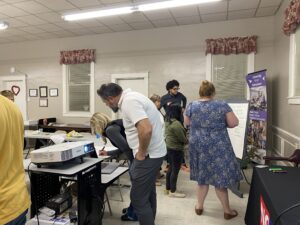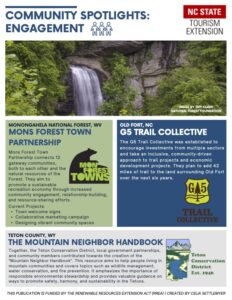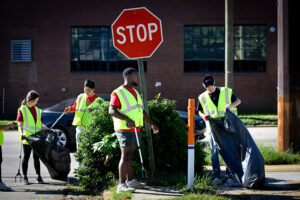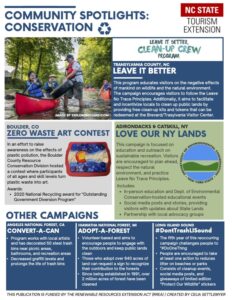Community Spotlights on Engagement & Conservation Campaigns
go.ncsu.edu/readext?946155
en Español / em Português
El inglés es el idioma de control de esta página. En la medida en que haya algún conflicto entre la traducción al inglés y la traducción, el inglés prevalece.
Al hacer clic en el enlace de traducción se activa un servicio de traducción gratuito para convertir la página al español. Al igual que con cualquier traducción por Internet, la conversión no es sensible al contexto y puede que no traduzca el texto en su significado original. NC State Extension no garantiza la exactitud del texto traducido. Por favor, tenga en cuenta que algunas aplicaciones y/o servicios pueden no funcionar como se espera cuando se traducen.
Português
Inglês é o idioma de controle desta página. Na medida que haja algum conflito entre o texto original em Inglês e a tradução, o Inglês prevalece.
Ao clicar no link de tradução, um serviço gratuito de tradução será ativado para converter a página para o Português. Como em qualquer tradução pela internet, a conversão não é sensivel ao contexto e pode não ocorrer a tradução para o significado orginal. O serviço de Extensão da Carolina do Norte (NC State Extension) não garante a exatidão do texto traduzido. Por favor, observe que algumas funções ou serviços podem não funcionar como esperado após a tradução.
English
English is the controlling language of this page. To the extent there is any conflict between the English text and the translation, English controls.
Clicking on the translation link activates a free translation service to convert the page to Spanish. As with any Internet translation, the conversion is not context-sensitive and may not translate the text to its original meaning. NC State Extension does not guarantee the accuracy of the translated text. Please note that some applications and/or services may not function as expected when translated.
Collapse ▲Written by Celia Settlemyer, Parks, Recreation and Tourism Major
About the Community Spotlights
Tourism Extension is wrapping up a program, Outdoor Recreation Stewards (ORS), a community-led initiative in Montgomery County, North Carolina. It seeks to empower county residents to be stewards of the Uwharrie National Forest and develop a deeper understanding of the value associated with recreation, nature preservation, and potential tourism development. ORS brings together community members to share their valuable expertise while providing a space to glean useful information from guest speakers. Participants in the program have voiced the desire to increase tourism within the area, promote equitable outdoor recreation access, and spur rural development. This presents the opportunity to launch a new environmental campaign while also recognizing the current challenges that must be addressed to meet their collective goals.
Seeking to fill this gap, a resource (PDF linked here) was created to share the experiences and efforts of community engagement and conservation-focused campaigns across the country from other communities bordering US National Forests and other natural areas. This one-pager provides information that could be useful to members of the public hoping to get inspiration on ways to improve the sustainability of forest ecosystems and discover how national forests can enrich their local community.
Community Engagement Campaigns

Residents participate in an asset mapping exercise.
Community engagement can take on many different forms and utilize many different strategies. It ultimately serves to increase the visibility and understanding of issues and empowers local residents to have a say in decisions that affect their towns, surrounding environment, and everyday lives. To achieve this, it is beneficial to have a clear direction and communicate goals, as this unites a community around shared efforts. Building engagement can increase a sense of belonging and build a culture of collaboration among residents. For example, the Mon Forest Towns (website linked) aims to promote a sustainable recreation economy through relationship-building, resource-sharing efforts, and increased resident awareness. They provide the people they serve with concrete, relevant goals and communicate steps they are taking to achieve them.
Community Engagement Campaigns:

Preview of Community Spotlights: Engagement page. Link to the full document here: https://go.ncsu.edu/uyq07tl.
Community Conservation Campaigns

Students take part in a Hillsborough Street Cleanup along Hillsborough street. Photo by Marc Hall
Community involvement is also an integral part of forest conservation. Litter tends to be more common in places that lack community ownership or pride (Pennsylvania DOT, 2023). Involving the community at every stage of change boosts recognition of the value that tourism and the national forests contribute to the area. It can easily be integrated into public events such as the Zero Waste Art Campaign (website linked), hosted by the Boulder County Resource Conservation Division. The public was invited to turn single-use plastic waste into art in an effort to raise awareness of the effects of plastic pollution. This not only served as an educational resource for the local community but can inspire others to create campaigns aimed at attracting and engaging the younger generations and shaping positive, long-term anti-litter habits.
Leveraging existing online resources and social media channels such as Facebook or Twitter, is an easy way to share ongoing efforts and initiatives. Activities funded by the ‘Love Our NY Lands’ campaign (website linked) include Instagram posts, litter-related education events such as hiker safety and sustainable recreation education from Forest Rangers, as well as outreach and partnerships with local environmental advocacy groups. Building awareness is the foundation for increasing public support of forest conservation and advocacy.
Community Conservation Campaigns:
- Leave It Better
- Zero Waste Art Contest
- Love Our NY Lands
- Convert-a-can
- Adopt-a-Forest: https://www.michigan.gov/dnr/about/get-involved/aaf
- #DontTrashLISound

Preview of Community Spotlights: Conservation page. Link to the full document here: https://go.ncsu.edu/uyq07tl.
Spotlights in Your Community
Natural areas like forest considerably impact the economy, the natural environment, and the people in gateway communities. Therefore, any individual, group or organization should be interested in their preservation. The campaigns highlighted in this resource occur within North Carolina and throughout the country. They demonstrate the success of many different scales of community engagement and conservation campaigns. These examples highlight the importance of individual efforts being brought together collaboratively to create bigger, lasting impacts on the community as a whole.
- Pennsylvania Department of Transportation. (2023). Litter Facts and myths. PennDOT.


